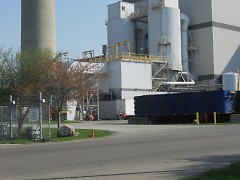A proposal that would allow the Kent County Board of Public Works more control over where solid waste ends up after leaving the curb is generating much debate between waste haulers and the county.
Private waste haulers in the region are concerned that language in the proposed amendments to Kent County’s Solid Waste Management Plan will give the BPW a monopoly over the waste and recycling industry. They say that businesses and residents in Grand Rapids and elsewhere in the county using private waste haulers will see higher prices for garbage removal services if these amendments become law.
County officials argue that the amendments are necessary both to comply with pre-existing policy directives set forth by the plan and to ensure a steady source of funding for the department.
The section of the amendment sparking debate allows the county the right to “flow control,” that is, the authority to require waste disposal companies to transport their trash and recyclables to county-owned facilities before directing that waste to private facilities. Examples of county-owned facilitites include the Material Recovery Facility that processes recyclables or the Waste to Energy Facility that incinerates municipal soild waste and, as a result, produced around 105,000 megawatts of electricity last year. The proposal uses flow control as “an effective legal approach to implement an integrated solid waste management program.”
At the hearing two weeks ago, Scott Duncan, owner of Duncan Disposal Service, said that if the amendment was implemented it would be a “detriment to the citizens of Grand Rapids,” increasing the cost that companies charge for waste removal services.
Landfills, both public and private, charge waste haulers a “tipping fee” in order to use their facilities. A study conducted by Lansing-based lobbyist group Michigan Waste Industries Association found that the tipping fee at the Kent County incinerator was around $47 per ton last year, compared with an average of $30 per ton at nearby private landfills. So dumping more trash at county facilities would increase the cost of doing business for private haulers, and this price increase would be passed on to the customer.
“It’s always scary when government takes action against the private sector. I’m not just trying to protect my company. This amendment will hurt customers as well,” said Duncan.
But Doug Wood, Director of the Kent County Department of Public Works, isn’t fazed by the controversy. He sees all the strong rhetoric against the amendment as a “reflexive reaction by the business community to perceived government interference.”
Wood is quick to point out that there are pre-existing goals and requirements set forth by the original solid waste plan that the county will not be able to meet unless the proposed amendments are approved. These include utilizing 50 percent of the solid waste generated in Kent County for recycling and alternative energy projects rather than depositing it into a landfill, and providing more opportunities to remove hazardous waste from the waste stream.
There are other issues Wood has to consider as well.
Currently, Kent County maintains three closed landfills: Sparta Landfill, Kentwood Landfill, and the North Kent Landfill. The Environmental Protection Agency has designated these landfills as contaminated sites and requires the county to spend approximately $800,000 per year to monitor and maintain them. According to Wood, flow control is not about taking business away from private haulers. It's about protecting the citizens of Kent County from the harmful effects of previously mismanaged landfills.
“Back in the '70s we made the decision to take over [the three landfills] instead of suing the local companies that operated the landfills and created the problems," said Wood. “We made the decision thinking that we wouldn’t always have to pay to maintain the sites. It turns out, we will. There are other ideas that we can consider, but if we don’t have a plan, the only option I can see for raising money for these programs is raising property taxes.”
Local environmentalists applaud the revised plan.
“We are not against private industry, but frankly there is no indication that private industry can deliver the same results as the county can when it comes to creating a long-term plan for minimizing the amount of trash going into the waste stream and protecting our water supply and environment," said Nick Occhipinti, policy director for the West Michigan Environmental Action Council.
The amendments were submitted to the BPW in December and must be approved before being sent to the County Commission for a final vote. Similar controversy in Grand Rapids started when a proposed change to the cost of citizens' trash removal received backlash.
Public comment on the proposed amendment has been extended until June 15. All comments must be submitted in writing to the Kent County Department of Public Works in order to be added to the official record.
The Rapidian, a program of the 501(c)3 nonprofit Community Media Center, relies on the community’s support to help cover the cost of training reporters and publishing content.
We need your help.
If each of our readers and content creators who values this community platform help support its creation and maintenance, The Rapidian can continue to educate and facilitate a conversation around issues for years to come.
Please support The Rapidian and make a contribution today.


